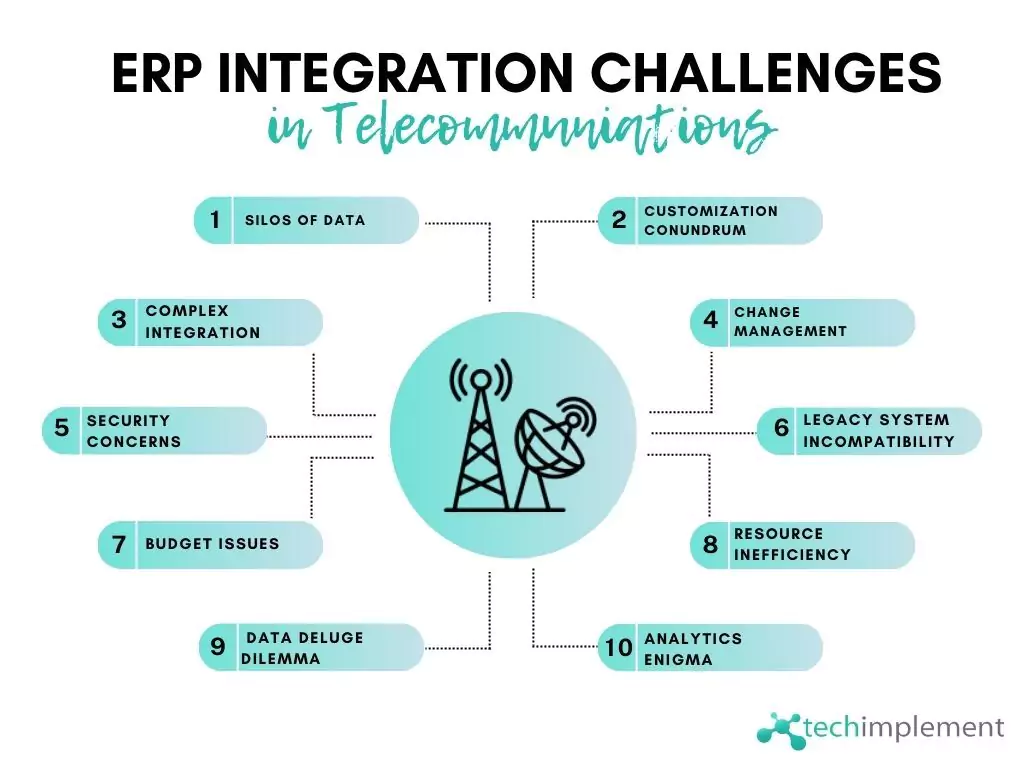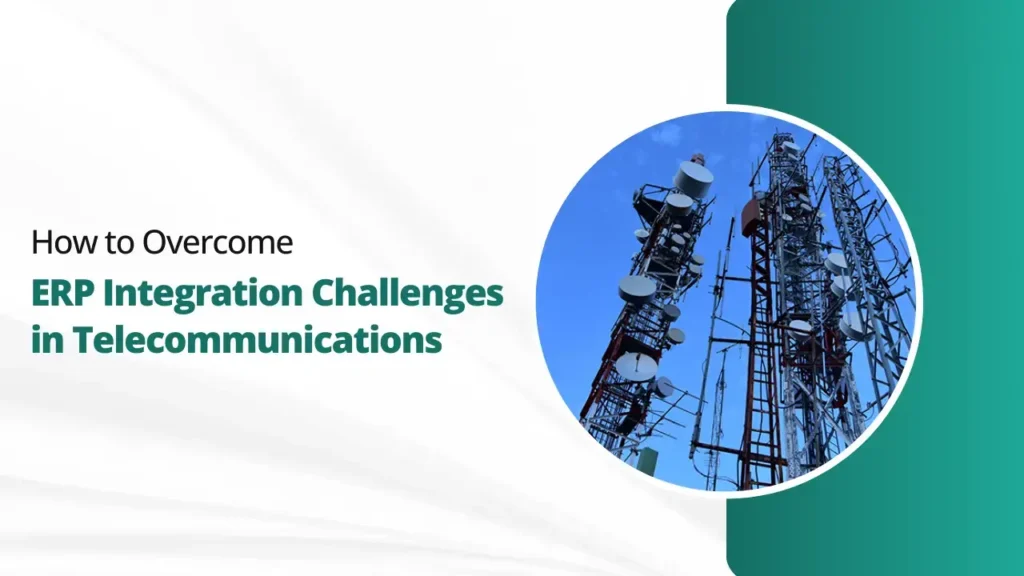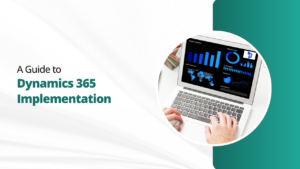The telecommunications industry is a dynamic force. It is constantly evolving with new technologies and ever-growing customer demands. To stay ahead of the curve, telecom companies need integrated systems that help them to operate efficiently. This is where ERP systems come in. It is a powerful software that can simplify core business processes across finance, inventory, HR, and more.
However, integrating an ERP system into a complex telecommunications landscape is no easy feat. Several ERP integration challenges can arise. These challenges can derail your journey to operational excellence. But, Fear not! This blog equips you with the strategies to deal with ERP integration challenges and achieve smooth integration.
ERP Integration Challenges and Their Solutions

Challenge #1: Silos of Data
Telecom companies often operate with multiple disparate systems. This creates data silos that hinder visibility and collaboration. Integrating an ERP system requires breaking down these walls. It also establishes a single source of truth for all your data.
Solution:
-
- Implement consistent data formats across all systems to ensure smooth flow and integration.
- Establish a centralized repository for critical data like customers, products, and suppliers.
- Identify and eliminate duplicate or inaccurate data before migration to the ERP system.
Challenge #2: The Customization Conundrum
ERP systems offer customization options. However, overdoing it can create compatibility issues and make future upgrades a nightmare. Striking the right balance between customization and standardization is crucial.
Solution:
-
- Customize the ERP system for core telecom processes. It includes billing, order management, and network provisioning.
- Utilize industry-specific ERP modules designed for telecom needs.
- Prioritize customizations that don’t hinder future system updates.
Challenge #3: Complex Integration
Integrating the ERP system with a web of existing telecom applications can be a complex maze. Compatibility issues and inadequate testing can lead to integration nightmares.
Solution:
-
- Implement an Enterprise Application Integration (EAI) platform to simplify the integration process.
- Partner with experienced ERP consultants who specialize in telecom integrations.
- Conduct rigorous testing throughout the integration process to identify and resolve any issues.
Challenge #4: Change Management Everest
Introducing a new ERP system often meets resistance from employees accustomed to their existing workflows. Effective change management is crucial for the successful adoption of ERP integration.
Solution:
- Communicate the benefits of the ERP system to all stakeholders early and often.
- Offer training programs to equip employees with the skills to use the new system.
- Encourage feedback and address concerns to ensure a smooth transition.
Challenge #5: Security Concerns:
Integrating disparate systems can create new vulnerabilities and access points for cyberattacks. Secure data access controls and security assessments are crucial to mitigate these risks.
Solution:
- Implement multi-factor authentication, data encryption, and intrusion detection systems to safeguard your data.
- Conduct vulnerability assessments and penetration testing to identify and address potential security weaknesses.
- Train employees on cybersecurity best practices like phishing awareness and password security.
Challenge #6: Legacy System Incompatibility:
Telecommunications often rely on legacy systems that may not be compatible with modern ERP technology. Integrating the new system while maintaining the functionality of the old can be difficult.
Solution:
- Migrate data and functionalities from legacy systems to the ERP in phases. Prioritize core processes and minimize disruption.
- Utilize specialized tools to convert data from incompatible formats into a format compatible.
- Use APIs to establish secure communication between legacy systems and the ERP.
Challenge #7: Budget Issues:
ERP implementation and integration can be costly. It encompasses software licenses, hardware upgrades, consultant fees, and training programs.
Solution:
- Conduct a thorough cost-benefit analysis to justify the investment in ERP integration.
- Explore cloud-based ERP solutions, open-source options, and subscription models to reduce upfront costs.
- Train internal IT personnel and utilize their expertise to manage project costs.
Challenge #8: Resource Inefficiency:
ERP integration demands skilled IT personnel familiar with both telecom systems and ERP. This combination can be difficult to find. Existing IT staff may have a strong understanding of one aspect but lack the necessary knowledge to tackle the other.
Solution:
- Train existing IT staff on ERP and telecom integrations to maximize internal resources.
- Recruit consultants with expertise in both ERP and telecom to fill skill gaps.
- Use managed services for specific tasks like data migration or security assessments.
Challenge #9: Data Deluge Dilemma
Integrating disparate telecommunications systems can result in a massive influx of data. This can overwhelm existing infrastructure and make it difficult to extract meaningful insights. This data deluge can impact performance, hinder decision-making, and create data management headaches.
Solution:
- Implement clear data governance policies to ensure data quality and accessibility.
- Establish a central data warehouse to consolidate and organize data from various sources.
- Use data integration tools to automate data extraction, transformation, and loading (ETL) processes.
- Invest in data analytics platforms to generate actionable insights.
- Use data visualization tools to present complex data clearly and concisely.
Challenge #10: Reporting and Analytics Enigma:
Integrating data from various sources within the ERP system can be complex. It can hinder real-time reporting and insights into key performance indicators.
Solution:
- Use data integration tools to aggregate data from various sources within the ERP system.
- Establish clear data governance policies to ensure data quality, consistency, and accessibility.
- Use reporting tools within the ERP system to generate real-time reports into KPIs.
Tech Implement: Your ERP Integration Partner
In this blog, we’ve tackled ERP integration challenges, from siloed data to resource inefficiencies. But conquering these peaks doesn’t require a solo climb. As you continue the path to ERP integration, Tech Implement stands beside you as your trusted partner.
Ready to scale your ERP mountain? Contact Tech Implement today!
FAQs
What is ERP in telecommunication?
ERP in telecommunication refers to ERP systems customized to meet the specific needs of the telecommunications industry.
What are the challenges of implementing an ERP system?
Challenges include resistance to change, data migration complexities, high initial costs, and the need for extensive training.
Why is it difficult to integrate an ERP system into an organization?
Integrating an ERP system is challenging due to the need for aligning diverse business processes, and ensuring data accuracy and consistency.
How do you overcome ERP challenges in the Telecommunication industry?
Overcoming ERP challenges in the Telecommunication industry involves thorough planning, addressing specific industry regulations, and providing extensive training.
What is the best ERP for telecom industry?
Popular ERP solutions for this sector include SAP S/4HANA, Oracle Communications, and Microsoft Dynamics 365 Finance and Operations.





